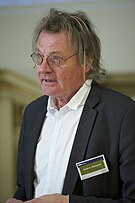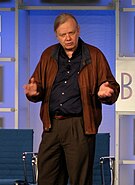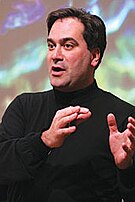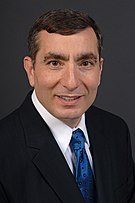This is an old revision of this page, as edited by Antony-22 (talk | contribs) at 07:04, 14 August 2018 (→History: copyedits). The present address (URL) is a permanent link to this revision, which may differ significantly from the current revision.
Revision as of 07:04, 14 August 2018 by Antony-22 (talk | contribs) (→History: copyedits)(diff) ← Previous revision | Latest revision (diff) | Newer revision → (diff) Award| Feynman Prize in Nanotechnology | |
|---|---|
| Description | Experimental and theoretical advancements in nanotechnology research |
| Country | United States |
| Presented by | Foresight Institute |
| First awarded | 1993 |
| Website | www |
The Feynman Prize in Nanotechnology is an award given by the Foresight Institute for significant advances in nanotechnology. Two prizes are awarded annually, in the categories of experimental and theoretical work. There is also a separate challenge award for making a nanoscale robotic arm and 8-bit adder.
Overview
The Feynman Prize consists of annual prizes in experimental and theory categories, as well as a one-time challenge award. They are awarded by the Foresight Institute, a nanotechnology education organization. The prizes are named in honor of physicist Richard Feynman, whose 1959 talk There's Plenty of Room at the Bottom is considered to have inspired and informed the start of the field of nanotechnology.
The annual Feynman Prize in Nanotechnology is awarded for pioneering work in nanotechnology, towards the goal of constructing atomically precise products through molecular machine systems. Input on prize candidates comes from both Foresight Institute personnel, and outside academic and commercial organizations. The awardees are selected mainly by an annually changing body of former winners and other academics. The prize is considered prestigious, and authors of one study considered it to be reasonably representative of notable research in the parts of nanotechnology under its scope.
The seaprate Feynman Grand Prize is a $250,000 challenge award to the first persons to create both a nanoscale robotic arm capable of precise positional control, and a nanoscale 8-bit adder, conforming to given specifications. It is intended to stimulate the field of molecular nanotechnology.
History
The Feynman Prize was instituted in the context of Foresight Institute co-founder K. Eric Drexler's advocacy of funding for molecular manufacturing. The prize was first given in 1993. Before 1997, one prize was given biennially. From 1997 on, two prizes were given each year in theory and experimental categories. By awarding these prizes early in the history of the field, the prize increased awareness of nanotechnology and influenced its direction.
The Grand Prize was announced in 1995 at the Fourth Foresight Conference on Molecular Nanotechnology and was sponsored by James Von Ehr and Marc Arnold. In 2004, X-Prize Foundation founder Peter Diamandis was selected to chair the Feynman Grand Prize committee.
Recipients
Single prize

| Year | Laureate | Institution | Scope of work |
|---|---|---|---|
| 1993 | Charles Musgrave | California Institute of Technology | Molecular modelling of atomically precise manufacturing |
| 1995 | Nadrian C. Seeman | New York University | DNA nanotechnology |
Experimental category








Theory category


| Year | Laureate | Institution | Scope of work |
|---|---|---|---|
| 1997 | Charles Bauschlicher | NASA Ames Research Center | Computational nanotechnology |
| Stephen Barnard | |||
| Creon Levit | |||
| Glenn Deardorff | |||
| Al Globus | |||
| Jie Han | |||
| Richard Jaffe | |||
| Alessandra Ricca | |||
| Marzio Rosi | |||
| Deepak Srivastava | |||
| H. Thuemmel | |||
| 1998 | Ralph C. Merkle | Zyvex | Molecular tools for atomically-precise chemical reactions |
| Stephen Walch | ELORET Corporation/NASA Ames Research Center | ||
| 1999 | William A. Goddard III | California Institute of Technology | Modeling of molecular machines |
| Tahir Cagin | |||
| Yue Qi | |||
| 2000 | Uzi Landman | Georgia Institute of Technology | Computational materials science for nanostructures |
| 2001 | Mark A. Ratner | Northwestern University | Molecular scale electronics |
| 2002 | Don Brenner | North Carolina State University | Molecular machines for molecular manufacturing |
| 2003 | Marvin L. Cohen | University of California, Berkeley | Modeling of new materials |
| Steven G. Louie | |||
| 2004 | David Baker | University of Washington | Development of RosettaDesign |
| Brian Kuhlman | University of North Carolina, Chapel Hill | ||
| 2005 | Christian Joachim | French National Centre for Scientific Research | Theoretical tools and design principles for molecular machines |
| 2006 | Erik Winfree | California Institute of Technology | DNA computing |
| Paul W. K. Rothemund | |||
| 2007 | David A. Leigh | University of Edinburgh | Design and synthesis of molecular machines |
| 2008 | George C. Schatz | Northwestern University | Modeling of dip-pen nanolithography, and of plasmon effects in metallic nanoparticles |
| 2009 | Robert A. Freitas Jr. | Institute for Molecular Manufacturing | Mechanosynthesis and systems design of molecular machines |
| 2010 | Gustavo E. Scuseria | Rice University | Tools for modeling of carbon nanostructures |
| 2011 | Raymond Astumian | University of Maine | Molecular machines powered by Brownian motion |
| 2012 | David Soloveichik | University of California, San Francisco | DNA computing using strand displacement cascades |
| 2013 | David Beratan | Duke University | Functional supramolecular assemblies |
| 2014 | Amanda Barnard | Australian Commonwealth Scientific and Industrial Research Organisation | Carbon nanostructure structure-function relationships |
| 2015 | Markus J. Buehler | Massachusetts Institute of Technology | Mechanical simulations of materials |
| 2016 | Bartosz Grzybowski | Ulsan National Institute of Science and Technology | Modeling of the outcomes of organic reactions |
| 2017 | Giovanni Zocchi | University of California, Los Angeles | Stress–strain analysis of soft nanoparticles |
| 2018 | O. Anatole von Lilienfeld | University of Basel | Methods for fast quantum mechanical modelling |
See also
- Kavli Prize in Nanoscience
- IEEE Pioneer Award in Nanotechnology
- ISNSCE Nanoscience Award
- UPenn NBIC Award for Research Excellence in Nanotechnology
References
- ^ Marcovich, Anne; Shinn, Terry (December 1, 2010). "Socio/intellectual patterns in nanoscale research: Feynman Nanotechnology Prize laureates, 1993–2007". Social Science Information. 49 (4): 615–638. doi:10.1177/0539018410377581.
- Heinze, Thomas; Shapira, Philip; Senker, Jacqueline; Kuhlmann, Stefan (2007-01-01). "Identifying creative research accomplishments: Methodology and results for nanotechnology and human genetics". Scientometrics. 70 (1): 125–152. doi:10.1007/s11192-007-0108-6. ISSN 0138-9130.
- ^ "Diamandis to chair Feynman Grand Prize committee | Solid State Technology". electroiq.com. Retrieved 2018-05-01.
- Nicolau, D.E.; Phillimore, J.; Cross, R.; Nicolau, D.V (July 2000). "Nanotechnology at the crossroads: the hard or the soft way?". Microelectronics Journal. 31 (7): 611–616. doi:10.1016/s0026-2692(00)00036-7. ISSN 0026-2692.
- Davidian, Ken (2005). "Prize Competitions and NASA's Centennial Challenges Program" (PDF). International Lunar Conference. Retrieved 2018-05-18.
{{cite journal}}: Cite has empty unknown parameter:|dead-url=(help) - ^ Marcovich, Anne; Shinn, Terry (2014). Toward a New Dimension: Exploring the Nanoscale. Oxford University Press. ISBN 9780198714613.
- Stallbaumer, Clayton (2016). "From Longitude to Altitude: Inducement Prize Contests as Instruments of Public Policy in Science and Technology" (PDF). Journal of Law, Technology & Policy. 2006 (1): 117–158 – via University of Illinois.
- ^ Berube, David M. Nano-Hype: The Truth Behind the Nanotechnology Buzz. Prometheus Books. ISBN 9781615922369.
- Stix, Gary (1996). "Waiting for Breakthroughs". Scientific American. 274 (4): 94–99. JSTOR 24989486.
- Guthrie, Julian (2017-09-05). How to Make a Spaceship: A Band of Renegades, an Epic Race, and the Birth of Private Space Flight. Penguin. ISBN 9781101980491.
- "First Feynman Prize in Nanotechnology Awarded". Foresight Update. Foresight Nanotech Institute. 15 December 1993. Retrieved 10 April 2011.
- Forrest, David R. (1994-10-01). "Third foresight conference on molecular nanotechnology". JOM. 46 (10): 28–29. doi:10.1007/BF03222604. ISSN 1047-4838.
- Phelps, Lewis M. (30 November 1995). "1995 Feynman Prize in Nanotechnology Awarded". Foresight Update. Foresight Nanotech Institute. Retrieved 10 April 2011.
- Pelesko, John A. (2007). Self Assembly: The Science of Things That Put Themselves Together. CRC Press. p. 201. ISBN 9781584886884.
- ^ "1997 Feynman Prize in Nanotechnology Awarded to Teams at IBM Zurich and at NASA Ames". Foresight Nanotech Institute. Retrieved 10 April 2011.
- ^ "1998 Feynman Prize in Nanotechnology". Foresight Nanotech Institute. Retrieved 10 April 2011.
- ^ Swaine, Michael (March 1999). "Little Engines That Could". Dr. Dobb's Journal.
- ^ "1999 Feynman Prize in Nanotechnology". Foresight Nanotech Institute. Retrieved 10 April 2011.
- Collins, Philip G.; Avouris, Phaedon (December 2000). "Nanotubes for Electronics". Scientific American: 62–69. doi:10.1038/scientificamerican1200-62.
- ^ Wolfe, Josh (March 2003). "Nanotechnology's Power Brokers". Forbes/Wolfe Nanotech Report. Retrieved 2018-05-19.
- ^ "2000 Feynman Prize in Nanotechnology". Foresight Nanotech Institute. Retrieved 10 April 2011.
- ^ "2001 Feynman Prize in Nanotechnology". Foresight Nanotech Institute. Retrieved 10 April 2011.
- ^ "2002 Foresight Institute Feynman Prize". Foresight Nanotech Institute. Retrieved 10 April 2011.
- ^ Burnell, Scott R. (2002-10-13). "Nanoscience community honors its own". UPI. Retrieved 2018-05-18.
- ^ "2003 Foresight Institute Feynman Prize". Foresight Nanotech Institute. Retrieved 10 April 2011.
- ^ "2004 Foresight Institute Feynman Prize". Foresight Nanotech Institute. Retrieved 10 April 2011.
- ^ "2005 Foresight Institute Feynman Prize". Foresight Nanotech Institute. Retrieved 10 April 2011.
- "Pittsburgh Post-Gazette from Pittsburgh, Pennsylvania on November 21, 2005 · Page 8". Newspapers.com. Retrieved 2018-05-13.
- ^ "2006 Foresight Institute Feynman Prize". Foresight Nanotech Institute. Retrieved 10 April 2011.
- ^ "2007 Foresight Institute Feynman Prize". Foresight Nanotech Institute. Retrieved 10 April 2011.
- ^ "2008 Foresight Institute Feynman Prize". Foresight Nanotech Institute. Retrieved 10 April 2011.
- ^ "2009 Foresight Institute Feynman Prize". Foresight Nanotech Institute. 6 October 2009. Retrieved 10 April 2011.
- "Air Force-Funded Researcher Wins Feynman Prize for Experimental Work in Nanotechnology". AZoNano.com. 2009-10-19. Retrieved 2018-05-17.
- ^ "2010 Foresight Institute Feynman Prize". Foresight Nanotech Institute. 20 December 2010. Retrieved 10 April 2011.
- ^ "2011 Foresight Institute Feynman Prize". Foresight Nanotech Institute. 16 October 2012. Retrieved 20 October 2012.
- ^ Champness, Neil R. (March 2013). "Illuminating Feynman's vision". Nature Nanotechnology. 8 (3): 163–164. doi:10.1038/nnano.2013.28. ISSN 1748-3387.
- ^ "2012 Foresight Institute Feynman Prize". Foresight Nanotech Institute. 18 December 2012. Retrieved 18 December 2012.
- ^ "2013 Foresight Institute Feynman Prize". Foresight Nanotech Institute. 23 January 2014. Retrieved 25 January 2014.
- ^ "2014 Foresight Institute Feynman Prize". Foresight Nanotech Institute. 23 April 2015. Retrieved 5 May 2015.
- ^ "2015 Foresight Institute Feynman Prize". Foresight Institute. 2016-05-23. Retrieved 2016-06-02.
- Finkel, Elizabeth (2016-09-26). "Michelle Simmons: a quantum queen". Cosmos Magazine. Retrieved 2018-05-08.
{{cite web}}: Cite has empty unknown parameter:|dead-url=(help) - ^ "2016 Foresight Institute Feynman Prize". Foresight Institute. 2016-10-03. Retrieved 2016-10-22.
- ^ "2017 Foresight Institute Feynman Prize". foresight.org. Retrieved 2018-05-17.
- ^ "Foresight Institute Awards Feynman Prizes in Nanotechnology to Lutz, Heinrich, and von Lilienfeld; awards presented by Nobelist, Sir Fraser Stoddart & Jonathan Barnes". Foresight Institute. 2018-05-23. Retrieved 2018-05-30.
- Lenhard, Johannes; Küppers, Günter; Shinn, Terry (2007-05-16). Simulation: Pragmatic Constructions of Reality. Springer Science & Business Media. ISBN 9781402053757.
- Feynman Prize: Dr Amanda Barnard, ABC (Australia), 2015-04-30, retrieved 2018-05-12
External links
| Molecular nanotechnology | |
|---|---|
| Concepts | |
| Organizations | |
| People | |
| Works | |
| Other | |
| Related topics | |